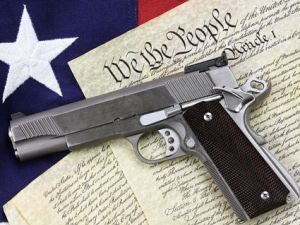
2A Rights and Lautenberg
The Lautenberg Amendment to the Federal Gun Control Act of 1968 became effective in 1996, and makes it a felony for anyone convicted of a “misdemeanor crime of domestic violence” (DV) to ship, transport, possess, or receive firearms or ammunition. There is no exception for military service members or military issued weapons. The Amendment also makes it a felony for anyone to sell or issue a firearm or ammunition to a person with certain DV convictions, regardless of rank.
What is a qualifying conviction?
A “misdemeanor crime of domestic violence” conviction is a qualifying conviction under the Lautenberg Amendment. The Amendment itself does not provide any additional guidance on determining what qualifies as a crime of domestic violence, but each of the armed services has published regulations that are all very similar. For example, the Marine Corps in MARADMIN 186/03 defines a crime of domestic violence as follows:
Crime of domestic violence means an offense that has as its factual basis the following elements: (1) the use or attempted use of physical force, or threatened use of a deadly weapon; (2) committed by a current or former spouse, parent or guardian of the victim, by a person with whom the victim shared a child in common, by a person who has cohabitated with the victim as a spouse, a parent or guardian, or by a person similarly situated to a spouse, parent, or guardian of the victim(s).
What effect does this have on your military career?
If you serve in the armed forces, a qualifying conviction signals your inevitable separation from the military. In other words, if you are convicted of a domestic violence offense at a special or general court-martial, you will be processed for separation. Administrative forums such as non-judicial punishment (NJP) do NOT trigger Lautenberg. If, however, you are going to a court-martial, be sure to ask your attorney about the Lautenberg Amendment and how it can affect you. It is normally not part of any pre-trial agreement, so ask your domestic violence attorney about it before entering into an agreement to plead guilty.
What about simple assault conviction that isn’t domestic violence?
Almost every state has specific provisions for domestic violence offenses. Many civilian court defendants plead guilty to a simple assault charge instead of a domestic violence offense to avoid a DV conviction. Unfortunately, even a simple assault conviction may qualify as a “misdemeanor crime of domestic violence” for purposes of the Lautenberg Amendment. Many attorneys are not aware of this and do not appreciate the impact such a conviction will have on a service member. Military policy is to look at the factual basis of the offense. If that factual basis meets the definition, it will be a qualifying conviction regardless of what the civilian court calls the offense.
What about a Stipulated Order of Continuance, or Deferred?
There are Washington alternatives to a guilty conviction. Stipulated Orders of Continuance (SOC) and Pre-Trial Diversion Agreements (PDA) are mechanisms by which someone can avoid a criminal conviction. These resolutions generally involve probation, treatment programs, and/or some type of community supervision (probation). If all the conditions are met for the allotted time handed down by the court, then the charge will be reduced or dismissed. If the charge is dismissed, then the Lautenberg Amendment will not apply as the charge did not result in a conviction. However, if the accused does not satisfy the court’s requirements during the probationary period, then the charge will not be dismissed and a conviction will be entered. At that point the Lautenberg Amendment will apply.
What will happen if you have a qualifying conviction?
If you have a qualifying conviction, you cannot possess a firearm or ammunition. If your command suspects that you may have a qualifying conviction, they are obligated to immediately secure your access to any government issued firearms or ammunition, unless you are deployed. Your command is also required to secure any privately owned firearms or ammunition kept in government housing or the base armory. You will then be referred to the command’s staff judge advocate (SJA) to determine if you have a qualifying conviction. If you do, you will be unable to complete annual training requirements that will require the use of firearms or ammunition (e.g., marksmanship training). Your command may also consider you non-deployable. Major military weapons, or crew-served weapons, are not considered to be firearms for the purposes of the Lautenberg Amendment and you may still work on and around those items.
If you are in the armed services, a qualifying conviction under the Lautenberg Amendment can end your career and result the loss of almost all of you benefits. So, before sign what you think is a “good deal” make sure you are asking the right questions. Ask about the Lautenberg Amendment and how your conviction can affect your military career. If you have any questions, you can trust the attorneys at Durflinger Oliver & Associates PS& Associates to protect you, your career and your family. Call today for your free consultation.
